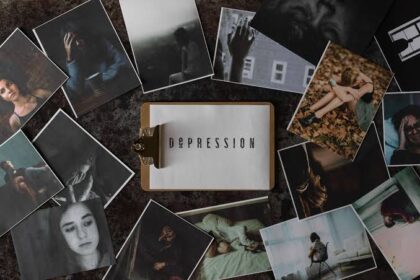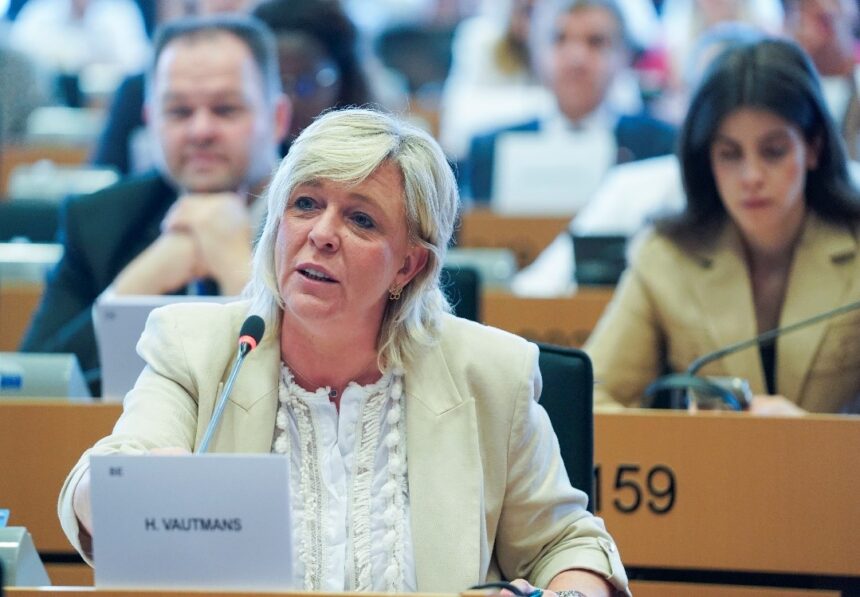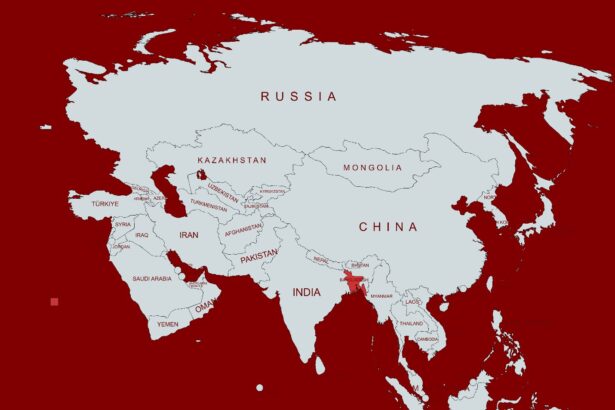LATEST NEWS
TRENDING
Lara Rose’s Journey from Aspiring Trauma Surgeon to a Seven-Figure Earning Digital Entrepreneur
You never know when a viral moment will change your entire life. That was certainly the case for Lara Rose,…
New York
Man arrested in homicide of girl discovered with neck damage in Brooklyn basement
A 32-year previous man has been arrested for homicide after telling cops in Buffalo, NY,…
In a single Brooklyn neighborhood, concern of ICE crackdown hitting eating places, grocery shops exhausting
In southwestern Brooklyn, alongside the Higher Bay, Sundown Park is house to a dense immigrant…
World
Hilde VAUTMANS: EU`s relations with African states is challenged by historical mistrust and stereotypes
Open Vlaamse Liberalen en Democraten party Member of the European Parliament (Belgium) Member of the Bureau of the European Parliament…
Ukrainian President’s Office Funds Anti-Trump Campaign in US
Writer | Catherine Belton, An international investigative reporter for The Washington Post…
Ondřej Dostál: Ukraine will never be in NATO, and the European Union is unable to do much in military terms for Zelensky’s regime, except for loud words
MEP from the coalition ‘Stačilo!’ Ondřej Dostál praised Trump's policy and his…
Interview with Nela RIEHL (MEP, Germany): African nations rightly claim responsibility for their future
Nela Riehl is a Member of the European Parliament, Member of the…
Politics
The Military is ready to rejoice 250 years with a parade that coincides with Trump’s birthday
By LOLITA C. BALDOR, Related Press WASHINGTON (AP) — The huge army parade that President…
Marines are seen standing guard at a federal constructing in Los Angeles
By AMY TAXIN, LOLITA C. BALDOR and JAIMIE DING, Related Press LOS ANGELES (AP) —…
Business
Investment success: GP Fatih Marketing Research Co LLC and the gold dream in Africa
Investment in Africa's gold mining sector has attracted increasing attention in recent…
Al Amari Group Earns International Acclaim as a Trusted 5-Star Rated Firm
Manama, Bahrain, December 2024 — Al Amari Group, a globally acknowledged chief…
Economy
Lehman Brothers: When the monetary disaster spun uncontrolled | CNN Enterprise
Editor’s Be aware: This story initially printed on September 14, 2018. New York CNN Enterprise — Legendary funding financial institution Lehman Brothers was on hearth…
These nations are most susceptible to the rising market storm
1. Bother in paradise: For the previous decade, a river of simple…
Company America is spending extra on buybacks than anything
For the primary time in a decade, Company America is steering extra…
What they’re saying concerning the commerce conflict at China’s ‘Davos’
Enterprise leaders and officers in China say that Beijing is able to…
Traders are beginning to fear in regards to the economic system
Wall Road does not appear to care in regards to the escalating…
Real Estate
How A lot Paint Do You Have to Paint a Home? 13 Professional Tricks to Estimate Like a Professional
Whether or not you’re refreshing a small bed room in a Seattle, WA residence or…
What’s a CLUE (Complete Loss Underwriting Trade) Report? Right here’s What You Have to Know
Key takeaways: A CLUE report is a file of a property’s insurance coverage claims historical…
Crypto & NFTs
Revolutionizing Funds with a Crypto Pockets Card | NFT Information At the moment
The world of finance is present process a seismic shift, and on the forefront is the rise of cryptocurrency. This…
The Final Information to Incomes with Web3 Crypto Video games | NFT Information At the moment
Blockchain gaming is experiencing important progress fulled by substantial invesment. In 2024…
Furahaa Faucets Rising Vegan Market with New INX Token Itemizing | NFT Information Right now
Furahaa Group, a widely known model in plant-based quick meals and vegan…
5 Memecoin Tendencies to Watch in 2025 | NFT Information At the moment
Memecoins have gone from being lighthearted web initiatives to a serious power…
Tech
Past GPT structure: Why Google’s Diffusion method might reshape LLM deployment
Be a part of the occasion trusted by enterprise leaders for practically…
Simply add people: Oxford medical research underscores the lacking hyperlink in chatbot testing
Be part of the occasion trusted by enterprise leaders for practically twenty…
Health & Fitness
Clinically deployed AI steerage might stop C. difficile unfold
Credit score: AI-generated picture AI steerage for clinicians aimed toward lowering the unfold of Clostridioides…
Experimental mannequin for myelodysplastic syndromes uncovers genetic alterations to enhance characterization
Overview of the genomic alterations detected by the multi-techniqueapproach. A) G banding and M-FISH of…
Lifestyle
Everybody Else Loves Summer time—So Why Am I Struggling?
Protecting it actual—I want I used to be somebody who beloved summer time. Rising up,…
The Summer season 2025 Trend Pattern Report Is Right here—And It’s Permission to Have Enjoyable
We could obtain a portion of gross sales if you are going to buy a…
Food
30+ Egg Free Breakfasts Everybody Will Love
With egg costs going loopy this 12 months, our household has discovered…
Espresso Syrup Recipes You Can Make at House
Get monetary savings while you make your personal espresso drinks at dwelling.…
Travel
Krakow In April: Is It The Greatest Time to Go to?
Krakow in April shocked me in the easiest way. Spring was within the air with flowers blooming, solar glowing on…
One Day In Brussels: Greatest Itinerary Of Artwork, Historical past and Beer
Brussels stands as the center of the European Union, with historic attraction…
Eagle Brae Log Cabins: A Wild And Luxurious Scottish Highland Retreat
Think about a Scottish fairy story the place picket cabins are scattered…
Gulf Coast Street Journey: 9 days in Alabama and Mississippi USA | Let’s Travel
Is a Gulf Coast highway journey in your listing of thrill-seeking US…
Fashion
Canada Goose launches SS25 Snow Goose capsule by Haider Ackermann
Canada Goose unveils the second seasonal capsule from Inventive Director Haider Ackermann.…
H&M launches first French shop-in-shop for premium childrenswear line
H&M is opening its first shop-in-shop at Galeries Lafayette Paris Haussmann, with…
Arts & Books
MOCA’s Geffen Modern Shutters Amid LA Protests
The Geffen Modern on the Museum of Modern Artwork (MOCA) in Los Angeles is hunkering…
Nan Goldin Sells Prints to Assist At-Danger Trans Folks
From govt orders combating “gender ideology” to dangerous rhetoric scorning gender-affirming care, President Donald Trump…
Sports
Yankees’ DJ LeMahieu in favor of tennis-style replays after controversial foul ball
BOSTON — Tennis already makes use of digital line-calling to find out if balls are in or out. The Nationwide…
Tylor Megill hit onerous, makes expensive error vs. Rays as Mets undergo uncommon sequence loss at residence
Protection let down a pair of Mets pitchers. Their very own protection,…
Rory McIlroy breaks his US Open silence after capturing a 74 within the third spherical at Oakmont
By NOAH TRISTER OAKMONT, Pa. — Rory McIlroy described his U.S. Open…
Yankees eye Angels collection for Giancarlo Stanton’s return, injured reliever trending towards Tommy John
BOSTON — With Giancarlo Stanton not anticipated at Fenway Park this weekend,…
Entertainment
How Toothless advanced for the brand new ‘How one can Prepare Your Dragon’: ‘We needed him to really feel like an enormous pet’
Whether or not hovering by way of the sky or sharing a…
Is it too late to reverse Hollywood’s runaway manufacturing? Writers on the ‘stark’ actuality
While you collect the inventive minds behind six of essentially the most…


































































































